
Unofficially obsessed with Google.
Google Deletes Own Blog
3/28/2006 03:12:00 AM
Sometime before 9:29 PM (PST): Trey Phillips goes to the URL googleblog.blogspot.com and finds a 404 not found error instead of the Official Google Blog. Opportunist that he is, Trey guesses that the blog has been deleted and races to register the username and blogspot hosting. 9:29 PM (PST): Trey Phillips makes his first post to the Unofficial Official Google Blog at googleblog.blogspot.com, complete with a standard Blogger template.
Google, fix your blog pleeasssee! <3
(P.S. Just to clear things up, I'm not associated with Google at all. I just wanted to take advantage of this before someone else with less worthy intentions did. The username was giving a 404, so I tried registering a new blog with it. Surprisingly, it worked. Oh, and no posting URLs in the comments or else they'll be deleted.)
POSTED BY TREY: 9:29 PM (PST)
[View screengrab of Trey's blog entry and the incomplete original post.] [Link to Trey's post which is now a 404 not found.] Between 9:29 and 11:15 PM (PST): Mass hysteria overwhelms the Google Bloggers. Trey Phillips has apparently hacked the Official Google Blog. Hysteria gets even more mass as it spreads to the blogsophere, audience to it all. Figuring out what happens, the brave Google Bloggers wield their power of eminent domain and wrest the Official Google Blog registration from Trey Phillip's hands just as he punches in another update to his unofficial version. 11:15 PM (PST): Official Google Blog comes back online (replete with all archives and original template), announcing that the Google Bloggers have rescued their blog and the rest of the world's bloggers have no evil forces to fear. Whew! Google is saved. Mid-celebration, the Google Bloggers quietly update their post to admit their blunder was little more than errant clicking on their Blogger interface. And we're back
The Google Blog was unavailable for a short time tonight. We quickly learned from our initial investigation that there was no systemwide vulnerability for Blogger. We'll let you know more about what did happen once we finish looking into it.
Update: We've determined the cause of tonight's outage. The blog was mistakenly deleted by us (d'oh!) which allowed the blog address to be temporarily claimed by another user. This was not a hack, and nobody guessed our password. Our bad.
*** Most notable about all of this is that Google was able to quickly repair the deletion with saved versions of its post archives and blog template. Impressive, but expected from the communication channel of a large operation. Surprising to me, however, is that Blogger blogs are available so quickly after their deletion. Many accounts that issue individual usernames and URL's hold deleted accounts for a short period of time before re-releasing the names. Not so with Blogger apparently. Thinking about what happened tonight, it is both humble and daring of Google to use its rather unsophisticated blogging tool to write one of the tech industry's most important blogs. But then, it would be ludicrous if they used a beefed up installation of say, WordPress, wouldn't it?
Googlewhacking Shows Confusion in Google's Redesign
3/25/2006 11:33:00 PM
Over in Google Blogoscoped, I found the trick to set my computer's cookie to load the Google test layout that is currently circulating to random IPs. Thanks to Kickboy who wrote in with clues about the workings of this cookie several weeks back. Q. What do the green bars mean?The biggest thing to note in the experimental redesign is the appearance of green bar graphs for each of the major Google search types on the left sidebar of the SERPs. Because the metric of these bar graphs is not given, I set up a quick test to see if I could figure it out. A. Number of Results
My first thought was that the graphs were meant to depict the number of search results available in each search product for the given query. So if the bar was almost fully green for Images and almost fully grey for Groups, you would instantly know that it was almost pointless to check your query in a Groups Search as there were almost no results available in that area. To test this, I hunted for a recent googlewhack ("speedwriter clockwork" via googlewhack.com) that would provide easy to work with results numbers, and then compared the numbers of types of search results to the graphs in the left sidebar. Here's a screenshot of the search results page: 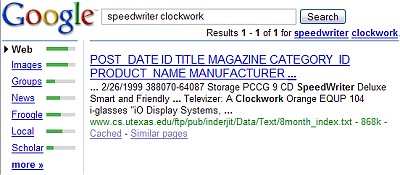 And here are the numbers of results for "speedwriter clockwork" for each of the search types: 1 Web0 Images1 Groups0 News0 Froogle0 Local0 ScholarAs you can see, no results were retrieved in Images, News, Froogle, Local, or Scholar despite the green bar graphs on the SERP having prominent green areas. I find it a bit deceiving (or perhaps just inconvenient), that the green bar would even begin to suggest existing results in these categories if clicking over to those categories shows absolutely nothing. To make sure I hadn't hit a wonky query (which certainly googlewhacks can be argued to be), I tried a few more terms. Each experiment showed similarly: the proportions for actually available search results varied greatly from the proportional usefulness suggested by the green bars. So much for that idea. A. Relevancy With my initial hypothesis disproven, my next suggestion is that perhaps these green bars are meant to suggest comparative relevancy of the different masses of results? But if that's true, then low traffic terms need some adjustment. For the googlewhack example above, search relevancy should be nil for categories for which there are no results. A. Something elseSo what are the green bars, then? Search results numbers and search relevancy seem to be out (though maybe this feature is still error-ridden enough to throw us off). What other thoughts are people having about the meaning behind the bar graphs?
Why to stop asking "Is Google a Portal?"
3/25/2006 10:21:00 PM
Any time it releases a product that makes information access more comprehensive, more meta, or more personalized, Google gets labeled as a portal-in-progress. The recent news of Google Finance, with its practical applications, channel functionality, and similarity to the portal offerings of the early 2000's, has added to this Google-as-portal discussion with new noise. Most articles frame these discussions with hesitant interrogatives: "Is Google already a portal?" "Google Finance: A Portal Play?" and uncertain suggestions: "Google Finance Sparks Portal Talk". Such discussion isn't new; Google has been a "suspected portal" for years now. And overall, the tone of these articles makes it sound like portals are a scary thing that Google wants no part in. With all the disagreement over whether or not Google is a portal, what's really going on here? 1. "Portal" is a sloppy word. 2. The portal, as we know it, is dead.
1. "Portal" is a sloppy word.
Here are a bunch of ways that portals have been described. They're all somewhat valid, and they're all somewhat inapplicable to what Google's end design seems to be. Take a look: A start pageThe page you set as your homepage, and most likely the one you use to jump to most of your web activities. Millions of people have Google.com as their initital browsing turf, so this must not be it... A directory A meta- or super- site that lists "all" other sites by topic, made most relevant in the days before search could retrieve more specific channels of information. A collection of standard web tools in one placeA site with its own brands of email, news, search, weather, homepages, etc all neatly collected for its users. AOL's channels are the perfect portal in this sense. But Google's got its own "channels." So this must not be the key to portaldom... A content aggregatorA site that combs the web for info on specific topics (though not through rigid categories) and displays it for your clicking fun. All content links lead to external sites. Google News anyone? In fact, Google's information retrieval system is one giant conglomeration of aggregation! A personalized pageA page that customizes its offerings to your selections or surfing habits has been called a personalized portal. This peaked with the "my" services: MyYahoo, MyExcite, MyAOL, etc. But Google's already got this: Personalized Homepages at google.com/ig. Your Google account now lets you do all kinds of things tailored to your preferences: write email, blog your thoughts, make homepages, track stock portfolios, manage your website, and even make money! A content aggregator + content providerA step above a content aggregator is the one that adds its own content into the mix. Yahoo! is precisely such a site. This is, to me, one of the most interesting areas to project in Google's future. Will there ever be content provided? I would not count it out, but this is not part of Google's mission statement, "to organize the world's information." Organizaton neither implies nor requires creation. The new Google Finance is said to tiptoe into this territory with its group discussion moderators and highly specific company profile descriptions. I say that ain't content. Content is what's made when you hire salaried people to write information you can't find anywhere else. But if a portal is a way of getting somewhere, then should the portal's content--what it says--even matter?
A search/directory page strewn with links and ads
For those who say Google is not a portal just because it isn't messy like Yahoo, should clutter really be the defining characteristic in web terminology (portal or other) that implies information organization?
A browser's default start page
This is certainly a specific, outdated definition of a portal. But it's the idea that when you opened Netscape or AOL you were greeted by a page that Netscape or AOL had created with links and search fields that it felt would serve your browsing needs. When GBrowser talks were loud, Google Portal talks were just as vociferous. But adding a browser into the mix would probably not answer "Is Google a portal?"
A gateway to a collection of specialized information
FirstGov is an example of a site that claims to provide anything and everything you need to know about a certain topic. It's basically a search + directory for a specific category of information. Examples of Google's contribution to these specialized information sites are its News and Finance searches.
A site that labels itself a "portal"
Obvious. It really seems that the world will only agree that Google is a portal if Google steps up and calls itself one. But the company has no plans to release "Google Portal" and it will never activate the subdomain or directory portal.google.com or google.com/portal. So, if they're just waiting for a product release under the monicker "Google Portal," my hunch is, it ain't comin'. (For the record, Google's CEO Eric Schmidt has firmly denied "plans to become a portal.")
In summary: The reason no one can agree on whether or not Google is a portal, is that the word portal is just a sloppy description for services that Google already provides. Google (and many other companies) are pushing beyond portals.
2. The portal, as we know it, is dead.
In the internet sense, a portal was introduced as a way for net users to find information when the path to that information was otherwise unclear. The internet was in toddler phase and its users wanted to find the weather report without having to know URL's to get it. So a portal with links to everything, including weather, was the answer for that generation of the internet. As netizens grow increasingly more aware of the paths to the information they desire, then the idea of providing a page for people who don't know what's going on is increasingly of less use. Knowing URL's is much more commonplace than it used to be and the pre-eminence of search and specialized information hunting sites has made wading through hierarchies of links and pages of unrelated content a dead idea.
Jeremy Zawodny really poked at the endangered state of the portal when he said that the question isn't really whether or not Google will become a portal (assuming the collective conscious thinks it's not one yet), the question is what will the next generation portal look like? The comments on his thoughts include notes about discovery as the next great portal/path. Sites like Amazon use discovery to show you products that you may not have searched for but that probably relate to your interests. Google's related content tests show that the incorporation of discovery process into Google's many operations is not far away. Further speculations (as shown in highly customizable homepage interfaces like protopages and pageflakes) are that personalization at the individual's own discretion is also where the future of the "portal" is. In that sense, it's no longer a gateway, but instead a user's own guide map, written and discovered by themselves rather than forged by a company's static webpage vision for what information is interesting. We're leaving the days of company-forged content, and beginning to forge our own.
So whether or not Google releases channels for every type of information and whether or not Google collects all of these channels all on one page (Google.com only links to a few) with perfect personalization (the uber-Google Personalized Homepage), the concept of a portal is poorly defined and outdated. And so is trying to fit Google into it.
Error Message in Google Chat
3/22/2006 10:10:00 PM
Google's record of "uptime" has always impressed me. I'm not saying there's never downtime or delayed product roll out, but rarely do I log in to any Google application and see an error message. It surprised me, then, to log into Gmail this afternoon and see this error which blends seamlessly into the Chats interface as if it expects to be displayed every once in awhile: 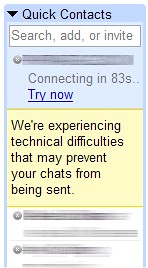 "We're experiencing technical difficulties that may prevent your chats from being sent." I do not expect this connection fault to be a recurring problem, but I do wonder if it is in any way indicative of some revisions to the interface going on behind the scenes.
Ctrl + Ctrl to Quick Search
3/15/2006 12:52:00 PM
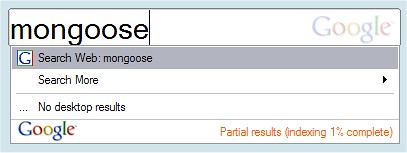 Google's newest announcement Google's newest announcement is Quick Search, a Google search box that you can call with a quick double-tap on the Ctrl key during any computing task. No browser loading required--great efficiency hack! Quick Search is bundled with Desktop, which Google says has just left beta. Now before you get yours, here's the good and bad: The Good:
Search Google without grabbing the mouse.Quick Search works well if you're rapidly typing into your blog engine or word processor and need to run a query. Quick Search eliminates the annoying tasks of switching windows or even needing to run the browser initially at all. Now, you might be remembering a project that Google once had in its Labs-- Keyboard Shortcuts. Before Google Labs dropped these, you were able to key through your search queries and pages. Imagine if Quick Search could initiate keyboard shortcuts on the resultant Google page so that calling a query and going through results could be handled entirely through the keyboard? Something to watch for.
Search interface is sleek, small, and loads (almost) instantly.You might also notice that Google has enabled slight transparency on the Quick Search box so you aren't completely sidetracked from your active window.
Search News, Images, Groups, etc using additional Ctrl commands.
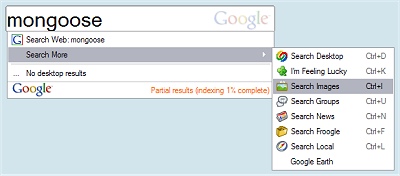
Instead of just hitting enter after your query, you can hit another Ctrl command to narrow your search to one of Google's specific search types:
Desktop Ctrl+D
I'm Feeling Lucky Ctrl+K
Images Ctrl+I
Groups Ctrl+U
News Ctrl+N
Froogle Ctrl+F
Local Ctrl+L
Google Earth is also available, but only through the drop down menu (use the arrow keys) that lists these search options.
Also search your desktop.
Since it's bundled with the Desktop product, this is just obvious. I haven't activated file indexing, but it looks like Quick Search uses a Google Suggest-like dropdown to show you potential file matches to your query. You can choose these instead of doing a web search by arrowing down to select the appropriate file or by hitting Ctrl+D as shown above.
Same shortcut toggles it on/off.
Ctrl+Ctrl opens the Quick Search box, and the same shortcut hides it if you don't feel like finishing your query. See the next note for some implications of these actions.
Query history clears after 30 seconds.
At first I was concerned that when I typed in "mongoose" then hid the window and instantly popped it up again, "mongoose" was still in the search field. All kinds of problems that could cause you in the office or on shared computers! But after some experimentation, I discovered that when you hide Quick Search rather than hitting enter to load the results, a 30 second timer is started. After 30 seconds, re-opening Quick Search will present a blank field.

If you re-open Quick Search within that 30 second window, the search will be saved and hiding the window again will activate a new 30 second count. So, unfinished searches are saved only in the very short term and you shouldn't run into problems with the next users seeing your uncalled queries.
The Bad:
Only comes bundled with Google Desktop.
Despite being a huge Google fan, I don't have Desktop installed on my computer. That meant I had to get it to try Quick Search. It's my feeling that Quick Search should be a separate, tiny tiny download that just integrates with Google Desktop should you prefer. If you share that qualm, you can download Desktop then disable everything (the sidebar, file indexing, etc.) and just enable Quick Search. The Desktop will run in your system tray (obviously in order for Quick Search to work), but you won't give up screen real estate or let your files be crawled.
The resulting browser window is a bit startling.
I was hesitant to hit enter on my first Quick Search query. Where would I be taken? If I had both Firefox and IE open, which browser would Quick Search choose? From my experiments this morning, it looks like Quick Search just goes with your default search engine preference. That means that in Firefox, it will simply open a new, active tab in the window you're working on. In IE, it will open up a new window. Score another for tabbed browsers that use less load time. No real way to fix the "startle" issue, but just be aware that your browser will "jump" to the top of your window stack in order to show your search results in the top active window.
How Google Gains:
Plus one (two, ten thousand?) for Google in search engine share wars.
Forget having to make you set your browser preferences in numerous places like your IE and Firefox browsers and your various browser toolbars. Once you've installed Desktop and if you've enabled Quick Search, Google has locked you into their search engine. They are building their SE share over Yahoo, MSN, Ask, etc.
They make you download Desktop.
Obvious. But it forces you to try and possibly adopt another Google product.
In the end, increases revenues all the way around.
The easier it is to search, the more you'll do it. And with more search comes more of Google's booming ad revenue.
SketchUp to Make Google Earth 3D
3/14/2006 02:14:00 PM
Today, Google made the not so surprising announcement that it has purchased friendly CAD software company SketchUp. The 3D modeling company owned by @Last Software has been friendly with Google Earth throughout this past fall--holding a conference with Google Earth experts, submitting lots of 3D models to the program, and creating a plugin for Google Earth so that users can create their own placemarks. With SketchUp, you can take 2D drawings (scanned or computer generated) then push and pull them in various directions to bring them "up"--into 3D form. The program also allows for much more complicated surface rendering, shadow creation, and other tools of 3D modeling, but here is a screencast demonstration I have created to show how SketchUp software, at its most basic level, makes 2D drawings into 3D models. The link goes to a Flash demonstration in a new window: 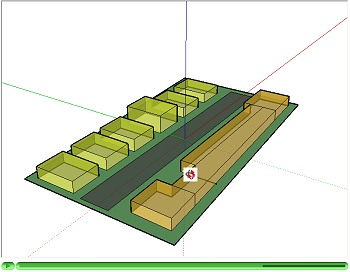 Click to view a SketchUp screencast demo Click to view a SketchUp screencast demo SketchUp is currently not free (priced at $495), though it does have an 8 hour trial version. And so begin the monetization questions: 1) Will SketchUp still be available for purchase as an independent product for non Google-Earth related projects? 2) Will Google offer a free version of SketchUp (perhaps with reduced capabilities) for users to make their own Google Earth placemarks? (It's doubtful that the entire program will be released for free as the pay version parallels quite nicely to the paid version of Google Earth--Pro. 3) Should we expect a next generation Google Earth that has many of these placemarks native in the interface? Looking forward to seeing what Google decides! Now here's some more SketchUp fun: Sketchup drawings on FlickrSketchUp's video tutorialSketchup models gallerySketchup one of the coolest products at MacWorldSketchup drawings on Google Image SearchDirectory of Google Earth placemarks, some made with Sketchup
Google Galaxy Starts with Mars
3/13/2006 02:03:00 AM
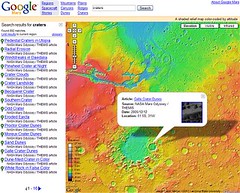 Google is one step closer to announcing a Google Galaxy (Universe/Solar System) product. Today Google introduced Google Mars, its Maps-like exploration of the surface of Mars. (This is likely an extension of Keyhole's Mars exploration that was quietly forgotten once Google acquired the company.) But forget Earth or Mars, Google is going to the outer limits! Between July 19 and 21, 2005, Google, Inc. registered the .com/net/org/info domains for Google's name plus all of the planets and words like galaxy, universe, and solar system: Planets:GoogleMercury .com .net .org .infoGoogleVenus .com .net .org .infoGoogleEarth .com .net .org .info (already released of course) GoogleMars .net .org .info (.com currently owned by another party) GoogleJupiter .com .net. org . infoGoogleSaturn .com .net .org .infoGoogleUranus .com .net .org .infoGoogleNeptune .com .net .org .infoGooglePluto .com .net .org .infoPossible Project Names:GoogleGalaxy .com .net .org .infoGoogleGalactic .com .net .org .infoGoogleUniverse .net .org .info (.com currently owned by another party) GoogleSatellite .com .net .org .info (created earlier on 4/08/05) GoogleSolarSystem .com .net .org .infoI have been sitting on this knowledge for awhile, and now it pays off with the release of Google Mars, making it almost certain that Google Galaxy (or some similar project that lets you flyover and explore all of the planets) is in the works. A few other things have tipped us off.. It is no coincidence that on July 20, 2005, one day after registering these domain names, Google released its Google Moon product (with moon-is-cheese joke) as a quirky yet sneaky foreshadowing to its coming project... Apparently Google Mars was made in collaboration with NASA (view the flyover video that marries all the info), so Google's announced partnership with NASA last September must be yet another clue to what is coming.... 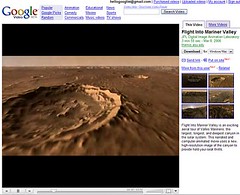 Earth, Moon, Mars, and what next? Most certainly, the Universe! [ Digg this]
Google's Writely: An Inside Look
3/12/2006 10:10:00 PM
 Google's acquisition of Writely has been widely speculated to be its sharpest bite yet at the Microsoft Office suite. With signups closed until Google re-releases the app, it will be awhile before most people can test the program's functionality. To get your mouths watering, here's a rundown of Writely's features and performance (with some appropriate comparisons to Microsoft Word and a few speculations on where Google is going with this).  Click for a full-size screenshot of my document in the Writely interface. Overall Impression:Writely is a powerful editor for online documents. I say online documents because Writely is primarily for documents that will be created, edited, presented, and shared via the web. Microsoft Word, on the other hand was designed for print materials (think measurement toolbars, header/footer layouts, paper size controls, label/envelope support, etc). Writers who create printable materials like pamphlets, college essays, and and portfolios will still require the advanced print editing features in software like Word. But webby types will enjoy the simplified, web-ready documents that can be created, shared, and filed in an instant. In sum, Writely takes some hints from Microsoft Word, subtracts some of its advanced print features, and then adds some exciting web capabilities to inhabit its new niche in word processing. Test Documents:In Writely, you can export your document to the following formats: HTML, Rich Text Format, Word doc, OpenOffice doc, PDF, and posts in supported blog clients. Below are links to Writely's exports of my test document in some of these formats (all open in a new window). HTML (on Writely's server) Word doc PDF I gave Writely a rather detailed layout to work with, and I am impressed with the way it was able to port these styles to the various document types. The line spacing and other typographic elements are off (stressing again that Writely is not for designing print documents), but legibility is retained across platforms. Document Editing:When creating a document, you can instantly add collaborators. 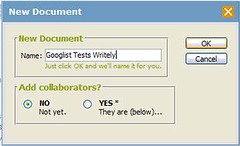 You then type directly into the Writely interface to create your document. Traditional text styling features like bold, italics, underline, sub/superscripts, text colors, highlights, left/right/center/justify, and ordered and unordered lists are all available. You can also insert tables, drag and drop images, and cut and paste text from other documents. Here are screenshots of the expanded toolbar menu items: 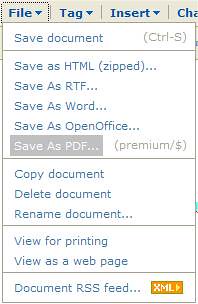 Export/save/copy/or subscribe to RSS. A functional and powerful file menu. 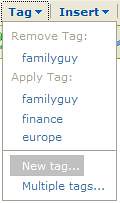 The future is tagging...tagging everything. Writely's document tags are user created and accessible only to the users that create them--e.g. you won't see tags for "motorcycles" or "avocado growth report" if you haven't created them. 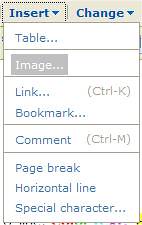 The table insertion tool is HTML-based rather than "document-based" as in MS Word. You get to specify rows/cols but also padding and cell spacing. Writely's link insertion lets you add links to other Writely documents, URL's, email addresses, and bookmarks.  Bookmarks are Writely's name for HTML's page anchors. You can insert bookmarks at any point in the document and then create links to those anchors via the hyperlink tool. Easy referencing within the same document, done web-style. 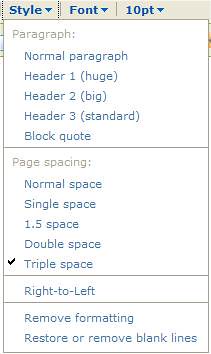 You can apply text classes like HTML's H1, H2, H3, block quote styles or erase formatting altogether. Line-spacing works well but is only applicable to the document as a whole rather than highlighted sections of a document. 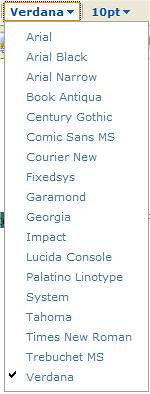 The pre-selected fonts are for the most part websafe, familiar, and easy to read onscreen. It just sucks that Writely even bothers to provide Comic Sans.  No customized 100 pt headings here. Writely chose font sizes that work with the web. Basically, Writely gives you control over most text styling elements that you would use when creating a classy HTML doc, except for link colors, page or div background colors, complicated mouseover effects (tooltips are editable though), and direct insertion of video or other non-image file types.  Spell check and an editable dictionary are included as well: Writely uses Word's squiggly red lines to indicate mistakes. No sign of grammar help, though.  And for those who must be brief, Writely also provides the standard word count. 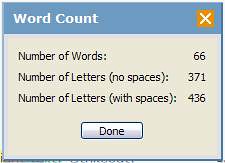 Writely is still working on advanced features (like find and replace) and I expect more tools on par with Word's functionality to crop up over time. Document Organization:Writely's most surprising bonus features are its support of tagging for documents and storage and prioritizing similar to the Gmail system. Each document can receive single or multiple user-created tags. When sifting through Writely files, you can view active documents, starred documents, documents pertaining to a single tag, and all documents at once. You can then copy/edit/delete/re-tag from there. Last edited dates are also given for each document. The interface is intuitive and responds instantly to your changes. Document Sharing:In addition to saving your document to various formats, you can choose to make documents public, private, or shareable amongst invited email addresses. 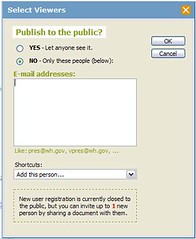 Users whom you invite will have access to that specific document as well as to their own Writely interface for creating new documents. Commenting is provided (see my test document) to identify changes and to track suggestions between users. (Comments are lost, however, if you export the doc to Word format.) You can also view a document's revision history in a list of its saved versions, making it easy to revert to previous versions. 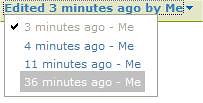 Finally, Writely lets you track changes to documents via associated RSS feeds (with some warnings about privacy of course). While it seems an obvious step for those accustomed to using RSS feeds, it's an astonishly new concept in the creation of documents which are seldom seen as "evolving" but rather seen as being in draft mode until they are saved /printed in final, fixed copy. When our feedreaders are full of document change feeds that require our constant monitoring, we'll hate this feature, but for now it's innovative. Document Accessiblity:Don't forget that Writely lets you upload files, including Word docs for editing within the Writely interface. After uploading a few folders of Word docs, you have instant access to all of your work online in an interface that both supports Word and exports (most of) your changes back into that format for office printing. While it may seem to have fewer features than Word, Writely does allow you to access documents from anywhere. This is a natural extension of web-based content creators like MT and WordPress which have made us accustomed to composing and publishing strictly on the web. Certainly this is also the future of workplace document creation and accessibility as well. What Writely Is Not:Writely is not a fully-featured, traditional desktop publishing program. It does not provide features like those in Word and InDesign that let you create custom paper sizes, apply multi-page layouts, design your own greeting cards, or import custom font families. Writely is not (yet) a term paper machine. There is no support for automatically updating footnotes, automatically updating tables of contents, or page numbering for that matter. It's just not that kind of app at this point. Where Google's Writely is Going:The major hypothesis is that Writely will be the MS Word of Google's predicted office suite. While this is surfactorily correct (in all likelihood), it ignores the fact that Google is probably not trying to create the next great word processor. Google is more probably trying to create the next great text engine that we haven't yet seen: a fully featured, strongly robust, always portable, platform-independent way of creating documents. We're talking reports that are written entirely online, edited seamlessly by multiple authors, saved securely on failsafe servers (GDrive anyone?), viewable on all machines, and instantly integrative with websites and email. (Connecting the Writely product to Gmail, Calendar, Google Groups, the hoped for GDrive, etc. is most certainly a long term goal for the project.) In sum, we shouldn't be too quick to call Google's Writely the next MS Word. It should be recognized for what it is, a new kind of document creation. Lesser discussed is Writely's potential effect on Blogger (and Google Pages). I wrote recently on things that Blogger can do to get back in the game, and integration with Writely would be a quick way for Google to assess those shortcomings. Writely already supports posting to Blogger, Google has already released an MS Word extension for posting from Word to Blogger, so why not stronger, more streamlined integration between the eventual Writely project and Blogger? We just may see it. As for "monetizing" the Google office suite, Writely provides no immediate answers. The service is currently free though it could eventually charge monthly/annual access/storage fees (not Google's style though). Google's tried and true advertising revenue model probably would not fit well here just as it does not with Blogger. Users won't want ads slapped at the top of their content and they probably will not be seeing ads in a document-creation interface. That doesn't mean users can't opt-in and put Google ads on their Writely documents if they wish. That is, after all, exactly the way that Blogger blogs are voluntarily monetized and that some books on Google's Book Search are monetized. How Google gets its money back with Writely (and I have no doubt it will, cleverly and many times over), we'll just have to wait and see.
Google Newsbites 3/10/06
3/10/2006 11:44:00 AM
Yahoo Leaked Google Calendar Pics to TechCrunch
3/08/2006 05:58:00 PM
Update: Mike Arrington has said he did not get CL2 screenshots from Yahoo, updated article is here. Always with the steamiest, most scintillating stories, Valleywag reveals that TechCrunch's screenshots of Google Calendar (CL2) came from Yahoo. Apparently a participant in Google's Early Tester program gave login info to a Yahoo contact who then leaked the CL2 screenshots and information to Michael Arrington of TechCrunch (who has many friends at Yahoo). To Yahoo's credit, it did alert Google to the leak of the login info, and Google was able to cancel the turncoat tester account. Good deeds aside, Yahoo probably took copious notes and made all kinds of screenshots that will enable it to make Yahoo Calendar evenly competitive with CL2 the day it is released. Of course, we're now struck with questions: Has Yahoo had access to all of Google's Early Tester programs? If so, for how much of Google's product history? Arrington says that 200 users are testing CL2, but I get the impression that the Early Tester program is larger than that number. CL2 was, however, listed on the Tester links page that was turned up a few weeks ago, making it seem like all testers must have been aware of CL2's availability. Also, how much can we expect that Google gleans from its "spies" in Yahoo's beta programs? The "sameness" of releases across the major search engines (maps programs, calendar programs, video search, fully featured webmail, blog and social community spaces) starts to make you wonder if they're not all working off a commonly shared beta list and just releasing products at different times and levels of completion. Regardless, this Google > Yahoo > TechCrunch slip reveals that much is to be learned by paying close attention to all available routes to information! Behold the power of company secrets, competitive strategy, and fast moving technology.
18 Ways for Blogger to Beef Up
3/08/2006 02:58:00 PM
 After Google acquired Blogger from Pyra Labs in February 2003, Blogger was re-released with new features and a wider user base. Pyra's Blogger had been simple yet buggy while Google's new Blogger was clean and stable--but Blogger was still elementary in comparison to more powerful tools. In the years since the " Great Blogger Relaunch" of 2004, Google has made few improvements: RSS feed support, moblogging, a Blogger version of trackbacks, a Blogspot navigation bar (like Bloghop's original blog browsing version), AdSense integration, and various Blogger extensions for Firefox. Despite these improvements, Blogger remains roughly the same simple blog press and splog hoster as before its Google acquisition. Here's what Google can do to beef up Blogger and reintroduce it to the sophisticated set:
- Categories and Tagging: The dearth of tagging and categories has become to Google's Blogger what the lack of commenting was to Pyra's Blogger--a monument to antiquity! Tagging as an organizational "folksonomy" has become the accepted way to group online information in the age of "Web 2.0." There are many Blogger categories workarounds out there, but it's time Google built an elegant categories system into Blogger itself. (Subcategories would be brilliant as well but mayhaps we're asking too much.) Given Google's penchant for the world "label," (see Gmail and Search History), we might see this organization system under that monicker.
- Tag-level Feeds: The addition of a tagging system would allow Blogger to support feeds gleaned from single tags. Rather than subscribing to a Blogger user's entire site feed, users could subscribe to feeds for just "News" or any other single tag name. This follows the popular practice of many linkfiltering sites and online newspapers where you can subscribe to a single author's articles, for instance.
- Post Scheduling: Blogger Pro had this feature (being able to set posts to publish to the past or future) but for the life of me I don't know where it went. Bloggers want chronological control of their content.
- Blogger Analytics: We've got Google Analytics, but I am anticipating that Google's recently acquired MeasureMap will be integrated into Blogger. Imagine that you could log into the Blogger dashboard and click a tab that says "Stats" or something similar and see uniques, pageviews, traffic graphs, referring URLs, referring search queries, and geolocations organized by blog title and viewable for a title's entire existence (wthout signing up for SiteMeter/Statcounter). This is easy and likely.
- Plug-in Support: Opening up Blogger's backend to its developer fans would bring an impressive collection of plug-ins, much like the mods that have made WordPress and MT uber-customizable.
- Blogsearch Zeitgeist: Google's Blogsearch has proven itself useful and popular. But it still has to compete with Technorati, Icerocket, and other blog search tools and rankings. Googlist pines for a sort of "Zeitgeist" (like the Google Search Zeitgeist), for the blog world. Most read blogs, most linked blogs, most popular blog topics, most popular blogsearch queries, days of the week with the highest volume of posts, etc. The eventual purpose is to map each blog into its relevant position in the context of an online conversation. Technorati has attempted to do this with blogger "authority," and I think Google's Blogsearch could eventually improve upon this by providing further stats upon which to base these authority/knowledgeability/popularity judgments. The enhancement would continue to encourage traffic between blogs and the building of a social community amongst Blogger's (and other blog tools') users.
- Blogger + Google Pages: The ability to create both dynamic blog pages and static site pages with matching CSS layouts would please many an online content provider. This also happens to be an area where many other blogging tools fall short, making it prime territory for Blogger to move in for the kill.
- Blogger + Gmail: This is most probably in the works, the only question is in what way specifically? My idea for the integration of Blogger and Gmail is to add more than just "post via email" capability. It's to allow pages created in either tool to be ported into the workspace of the other. For example, say you're having an email conversation and need to link to a blog or create a paragraph of text for possible publication. Inserting an editable Blogger page into the Gmail conversation thread might be a simple and powerful solution. Importing mail into a blog would be another useful feature.
- Blogger + Google Groups: If you've used Basecamp or Writeboard from 37 Signals, you can appreciate documentation of groupwork. Currently, single blogs can have multiple authors (see author groups for official Google blogs), but there are no real controls for attributing ownership to a group or passing unpublished suggestions to group members about blog posts. Definitely something for Google to look into.
- Blogger + Google Calendar: The world awaits Google Calendar, and the Googlist awaits Blogger integration with the mysterious scheduling app. One way? A referring link to a Blogger post could appear on each date of the Calendar that a post was made.
- Photo Archives: Blogger currently has an image uploading/inclusion form, but it does not integrate that with its blog archives. For photobloggers, Blogger could call these image URLs, render thumbnails, and then display the thumbnails in a simple array for the post archives. Blog authors could then choose between text lists or image arrays for their archive pages, depending on blog content. (See Wists for an excellent example of visual blogging and archiving.)
- Multiple File Type Uploading: MT allows users to upload various types of files and create usable URLs to these files for integration with posts. Want to upload a Power Point presentation or screencast? You can't do it with Blogger, which supports only image uploading via its Hello/Picasa arrangement. There is the argument for "those files take up too much space," but if Google is planning to store all of the world's information (see GDrive rumors), then let's hope we're going to see some GDrive integration with Blogger.
- Feed rendering: The ability to burn/render recent headlines from other Blogger blogs into the sidebar or a single post would encourage Blogger's social aspect and the discovery of new content within the blogosphere. This could easily be done via a copy/paste code snippet in Blogger and would be something like a better Rojo.
- Enhanced/Comprehensive "Trackbacks": Blogger's version of MT's trackbacks are "Links to this post." There are 2 issues here: 1) "Links to this post" never comprises all of the linking blogs that Google searches and the Blogger Comments Firefox extension find for site links. 2) "Links to this post" does not include contextual snippets like MT trackbacks do (the Web Comments extension does however). The solution here is just boosting the "Links to this post" feature with functionality of the Web Comments extension, rendering the information on the post page, and making the feature post-specific (rather than blog site-specific).
- Favicon Editing: It currently takes a bit of icon-making and HTML-wrangling (that is not always successful) to change a hosted Blogger blog's favicon. Since many feedreaders use site-specific favicons to distinguish titles in users' feed lists, it would benefit Blogger authors to be able to customize blog favicons via a simple image uploader. (Of course, this feature is not in Blogger's interest as it detracts from the Blogger brand, but the suggestion is there.)
- Elimination of Blogger Comments Interface: The bulky navy and brown page that Blogger presents for comment writing distracts from blog authors' discussions. Comment fields should be available within the post page to keep the reader's experience contiguous.
- Aggressive Spam Control: That means both splogs and spam comments. Blogger currently offers captchas for comments, but it has a real problem on its hands when a large minority of its blogs are spam infestations. Splogs denigrate Blogger's validity in the blogging world, and they should be controlled through user sign-ups and more diligent use of the "flag this blog" option.
- Alternate Hosted Domains: Currently, Blogger lets you FTP your blog to your own server or use its own hosted service--BlogSpot. As blogs grow in prominence professionally (think resumes, small biz blogs) and are referenced more often in traditional media (think WSJ, The Economist) it would be less awkward to refer higher-ups to URL's that do not contain the word "spot." Just a thought.
As even recreational blogging grows more sophisticated, Google's Blogger must keep up by making Blogger more robust. The features above are by no means the divine answer to Blogger's woes, but many are necessary steps to maintaining Blogger's user base, and therefore its relevancy to Google, Inc. Google's revenues depend on ads, ads depend on rich content, rich content depends on intelligent/adept writers, and those strong writers depend on a powerful, versatile blogging platform. Better Blogger = better content = more ad revenue. Yes, it all goes back to green. [Before tackling many of these improvements, Google must decide whether or not to merge Google accounts profiles with Blogger user profiles. When Yahoo acquired Flickr, it inconveniently began to require all new users to register with Yahoo in order to use Flickr (rather than just registering on Flickr itself). This caused a stir among original Flickr users but the purpose was to provide universal login to all of Yahoo's properties. Google will face this same accounts decision when deciding how to integrate Blogger with its other apps, if it does decide to.]
Google Newsbites 3/08/06
3/07/2006 11:25:00 PM
Google Community
3/07/2006 04:26:00 PM
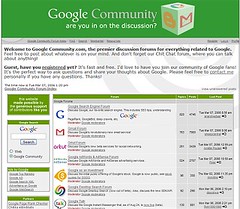 I first came across Google Community, a Google-specific collection of message boards, on Digg many months ago and it has since grown to nearly 15,000 registered users. While Google Community doesn't reach the technical depth that WebMasterWorld's communities do, GC provides a comfortable place to ask any and all questions relating to keeping up with Google's corporate dealings or implementing the latest Google tools. Most useful is the site's categorization of message threads by Google product (nearly 800 messages have been posted on Gmail alone so far). Thanks to Elliot of Google Community for his note on his site.
Google Newsbites 3/07/06
3/07/2006 04:04:00 PM
Google Newsbites 3/06/06
3/06/2006 01:51:00 AM
Google Newsbites 3/02/06
3/02/2006 01:54:00 PM
Ask.com Ad: Quit Wasting Time on Google
3/02/2006 12:47:00 PM
Just spotted--a Flash ad for Ask.com on Gizmodo that criticizes Google's all-text search results. Earlier this week I mentioned the lack of preview options in most search engine's all-text results, and here Ask.com is playing directly to that sort of complaint. Here are screencaps and a narration of the ad: 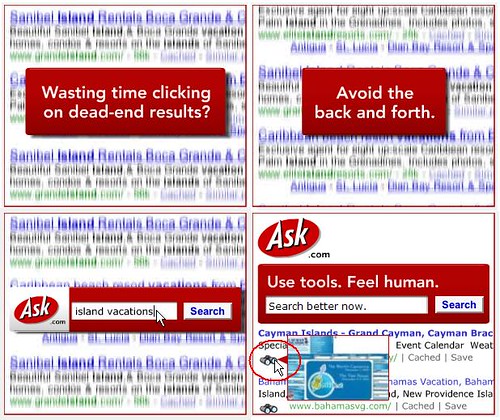
Search results (obviously intended to be Google's) fly up the screen in a blue/green text blur as the ad tells you to quit wasting time on dead-end results. Instead, query Ask.com and mouse over the binoculars to see a popup preview of the site before you click on it.
Ask has had this Binoculars feature since June 2004, but the required mouse overs make Binoculars less than perfect. (Much easier to see all thumbnail shots at once as the page loads.) It also seems odd that the new Ask.com sans Jeeves would be calling its tools "human." Nevertheless, Ask is highlighting its differentiating features to affirm its loud announcements earlier this week that Ask.com would climb to the top of search. Related Reading: February 27, 2006 - New Ask.com Press ReleaseFebruary 28, 2006 - The New Ask.com Blasts Off
AdSense Interface Gets a Facelift
3/02/2006 12:30:00 PM
As announced on the official Inside Adsense blog, AdSense users can now see a new control panel for creating and managing their ads. The disparate ad unit generators and help files have been reorganized into a decision tree: 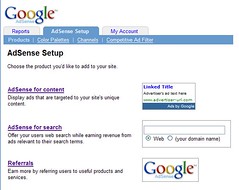 Want to set up a new campaign? Choose AdSense for content, AdSense for search, or referral options. Inside those categories, you'll find better organized options for ad units, link units, or code snippets. This redesign looks as if it's meant to appeal to many new AdSense users, providing clear directives to these users on how to get what you need out of AdSense (and hopefully how to profit more).
Google News Adds Feeds in More Languages
3/01/2006 12:37:00 PM
 Until now, Google only supported English RSS feeds for its News site--meaning only Americans, British, Australians, and users in other English-speaking countries had RSS feeds for their editions of Google News. So when a friend asked me to create a Google News Mexico feed in Spanish for Mexican soccer player Borgetti, I had to whip up an email alert that parsed into RSS for his Bloglines account. That was less than optimal and only delivered daily updates, at most. Now, Google has finally rolled out Google News feeds for the rest of the languages in its News arsenal. Just pick your favorite flavor and add to your newsreader. 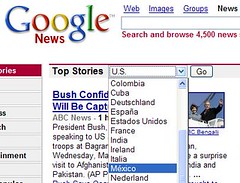 To subscribe, go to Google News, select your international edition from the dropdown menu at the top, then find the RSS feed for the page in the left sidebar. 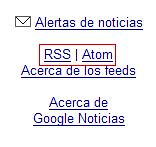 After selecting your edition, you can also enter a search term or click on a news topic, load the results, and select the RSS feed for the search or topic specific page. Happy international newsing, finally! Thanks Dirson, for spreading the word.
Google Newsbites 3/01/06
3/01/2006 12:16:00 PM
Google Newsbites 3/01/06
3/01/2006 12:16:00 PM
|
|
































